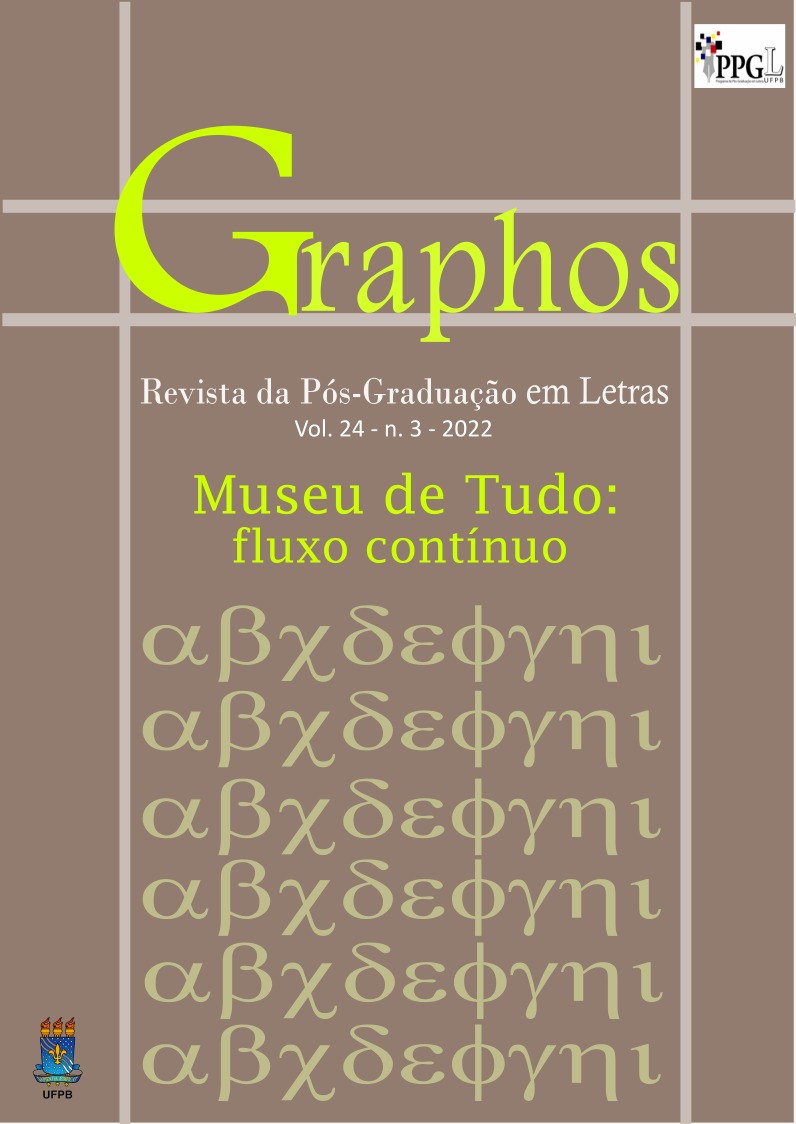Excess, coprophagy and podolatry in Glauco Mattoso’s lyrical poetry
DOI:
https://doi.org/10.22478/ufpb.1516-1536.2022v24n3.63515Keywords:
Brazilian poetry., Glauco Mattoso, Excess, Coprophagy, PodolatryAbstract
This paper studies the literary project of “coprophagic poetry” by Brazilian poet Glauco Mattoso, in which themes as homosexuality, podolatry and sadomasochism are constant. Mattoso’s poetry allow us to undertake a discussion about the conservatism, the contradictions, the deletion and the violence practiced by the bourgeois project of domination of human bodies and desires that are different from the heterosexual view, which, historically, and by its nature, is conceived as an operation management of the capitalist structure. Glauco Mattoso, as a contemporary poet, shifts our perspective to the obscurities and gaps that operate in the existential game of marginalized subjects. Therefore, what is here evaluated is the way in which the poet's literary language is arranged in order to enunciate a poetically engaged discourse.The research started from the intersection between the lyrical and the empirical persona of Mattoso in order to argument a poetics of excess supported, mainly, by the structuralist reading of Severo Sarduy (1979) in the essay “For an Ethics of Waste”. Important displacements, circularity, and parodic excess were the predominant expressive resources used. The heteronormative approach given to social and cultural life enables us to attest that the poetry of Glauco Mattoso manages literary tools that destabilize sociocultural structures by selecting what is considered abject for his performance.
Downloads
References
ELIOT, T. S. Tradição e talento individual. In: Ensaios. Trad. Ivan Junqueira. São Paulo: Art Editora, 1989. p. 37-48.
CAMÕES, Luís de. Sonetos de Camões. São Paulo: Ateliê Editorial, 2011.
MATTOSO, Glauco. Poesia Digesta. São Paulo: Landy, 2004.
MATTOSO, Glauco. Aos 60 anos, o poeta Glauco Mattoso faz revisão irônica de sua obra. [Entrevista concedida a] Guilherme Freitas. O Globo: Prosa, São Paulo, jul. 2011. Disponível em: https://blogs.oglobo.globo.com/prosa/post/aos-60-anos-poeta-glauco-mattoso-faz-revisao-ironica-de-sua-obra-393913.html . Acesso em: 23 mar. 2021.
MATTOSO, Glauco. Saccola de feira. São Paulo: nVersos, 2014.
MATTOSO, Glauco. Soneto 235 convicto. 2018. Disponível em: http://www.elsonfroes.com.br/sonetario/psicografado.htm. Acesso em: 25 maio 2021.
MATTOSO, Glauco. Bocage, o desboccado; Bocage, o desbancado. 2002. Disponível em: http://www.elsonfroes.com.br/bocage.htm. Acesso em: 20 out. 2020.
MORAES, Eliane Robert. O efeito obsceno. Cadernos Pagu, v. 20, p. 121-130, 2003. Disponível em: http://www.scielo.br/pdf/cpa/n20/n20a04.pdf. Acesso em: 14 set. 2020. DOI: https://doi.org/10.1590/S0104-83332003000100004
SARDUY, Severo. Escrito sobre um corpo. São Paulo: Perspectiva, 1979.
SILVA, Susana Souto. A escrita caleidoscópia de Glauco Mattoso. Fronteira Z, n. 5, p. 1-10, 2010. Disponível em: https://revistas.pucsp.br/fronteiraz/article/view/12293/8901. Acesso em: 11 jun. 2020.
SILVA, Susana Souto. O poema onívoro do engenho feirante Glauco Mattoso. In: MATTOSO, Glauco. Saccola de feira. São Paulo: nVersos, 2014. p. 9-21.
Downloads
Published
Issue
Section
License
Copyright (c) 2022 Ricardo Alves dos Santos Santos, Fábio Figueiredo Camargo

This work is licensed under a Creative Commons Attribution 4.0 International License.







